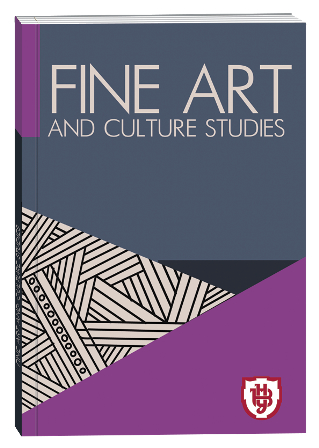МУЗИЧНЕ МИСТЕЦТВО В КОНТЕКСТІ ВИЩОЇ ОСВІТИ: ТЕОРІЯ, МЕТОДИКА ТА ПРАКТИКУМ РОБОТИ З КОЛЕКТИВОМ
DOI:
https://doi.org/10.32782/facs-2025-2-20Ключові слова:
музичне мистецтво, фахової підготовки, мистецької педагогіка, культурно-освітня діяльність, практикум роботи з колективомАнотація
Актуальність теми зумовлена потребою у формуванні нового типу фахівця у галузі мистецтва – не лише виконавця, а й організатора, лідера, здатного працювати в умовах командної творчості, міждисциплінарної взаємодії та відкритості до інновацій. У сучасних умовах розвитку мистецької освіти важливим завданням закладів вищої освіти є формування висококваліфікованих фахівців, здатних до творчої діяльності, професійної мобільності та ефективної комунікації в умовах художнього середовища. Одним із ключових елементів цієї підготовки є робота з музичним колективом, яка охоплює як практичну, так і методико-теоретичну підготовку майбутніх музикантів, педагогів, диригентів та організаторів культурно-мистецьких процесів. У статті розглянуто основи організації та управління музичним колективом у закладах вищої освіти. Проаналізовано теоретичні засади, методичні підходи та особливості практичної реалізації навчального процесу в галузі музичного мистецтва. Визначено ключові педагогічні принципи та психолого-педагогічні аспекти, що впливають на ефективність роботи з колективом. Порушуються питання структури, функціонування, взаємодії учасників музичного ансамблю, а також ролі керівника у створенні сприятливого творчого середовища. Здійснено аналіз сучасних тенденцій та технологій, що застосовуються у процесі формування професійних навичок майбутніх музикантів. Розглянуто практичні аспекти організації репетиційного процесу, підбору репертуару, планування навчального часу та особливостей підготовки до концертних виступів. Увага приділяється питанням психолого-педагогічної взаємодії у студентському середовищі, формуванню мотивації, розвитку лідерських якостей, відповідальності та співпраці в умовах творчої співпраці. Окремо розкриваються особливості адаптації учасників до різних художніх форматів та стилів. Зазначено значення практикуму як невід'ємної складової процесу професійної підготовки майбутніх керівників музичних колективів. Метою даної статті є всебічне теоретико-практичне осмислення процесу організації, методики та практикуму роботи з музичним колективом у закладі вищої освіти в контексті сучасних освітніх та мистецьких вимог. Методологія. З огляду на зростання культурного попиту в суспільстві та потребу у висококваліфікованих кадрах у сфері мистецької освіти, питання методичного забезпечення роботи з колективом набуває особливої ваги. Наукове обґрунтування методики керівництва музичними колективами, визначення психолого-педагогічних чинників їх ефективного функціонування, впровадження практикоорієнтованих форм навчання у підготовці студентів – усе це є запорукою успішного професійного становлення майбутніх фахівців. Наукова новизна дослідження полягає у комплексному осмисленні музичного мистецтва як складової фахової підготовки майбутніх фахівців у вищій освіті. Уперше здійснено інтеграцію теоретичних засад, методичних підходів і практичних аспектів роботи з музичним колективом у єдину освітню модель, що відповідає сучасним вимогам мистецької педагогіки. Виявлено та обґрунтовано ефективні педагогічні умови формування художньо-творчої компетентності студентів засобами колективної музичної діяльності. Матеріали дослідження можуть бути корисними викладачам, студентам, диригентам, організаторам культурно-освітньої діяльності, а також усім, хто працює у сфері музичної освіти.
Посилання
Яремчук О.М., Підгаєцька І.В., Мацієвська Л.В. Робота з вокально-виконавським колективом: навчальний посібник для здобувачів ЗВО спеціальності «Музичне мистецтво». Житомир, 2023. 120 с.
О. О. Шумська, В. Л. Олешко, Т. Є. Олешко Теорія і методика ансамблевого виконавства: навчально-методичний посібник. Комунальний заклад «Харківська гуманітарнопедагогічна академія» Харківської обласної ради. Харків, 2020. 108 с.
Откидач В. Методика роботи з оркестром : навч.-метод. посіб. Х. :ХДАК, 2019. 125 с.
Ґоулман Денiел (2020). Емоційний інтелект. Харків: Vivat. 512 с
Падалка Г. Педагогіка мистецтва: теорія і методика викладання мистецьких дисциплін. Київ: Освіта України. 2008. 274 с.
Ростовський О. Я. (2011). Теорія і методика музичної освіти: навч.-метод. посібник. Тернопіль: Навчальна книга – Богдан. 640 с.
Скопенко О. І., Цимбалюк Т. В. Сучасний словник іншомовних слів: близько 20 тис. слів і словосполучень. Київ: Довіра. 2006. 789 с
Юрій Юцевич. Музика: словник-довідник. Тернопіль, 2003. 404 с.
Дейнега О.В. Організація та проведення культурно-мистецьких масових заходів. Методичний посібник. Полтава. 2014. 42 с.
Шреєр-Ткаченко О. Історія української музики. К.: Муз. Україна, 1990. 147 с.







